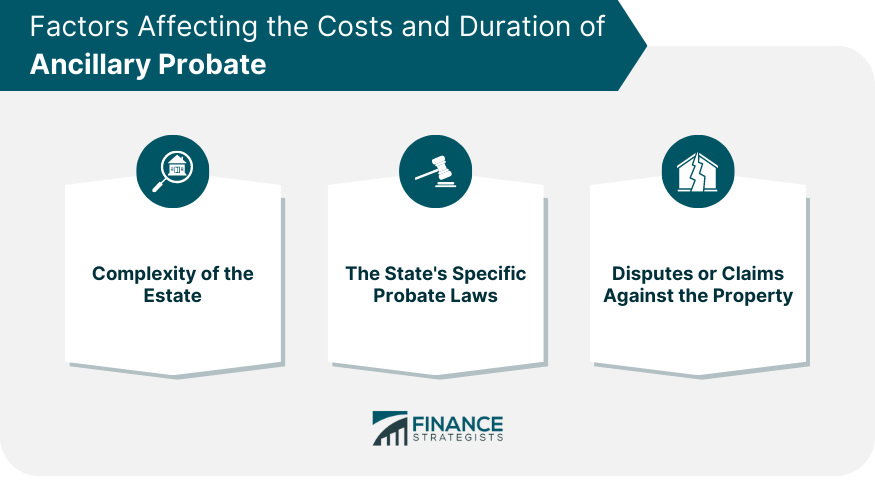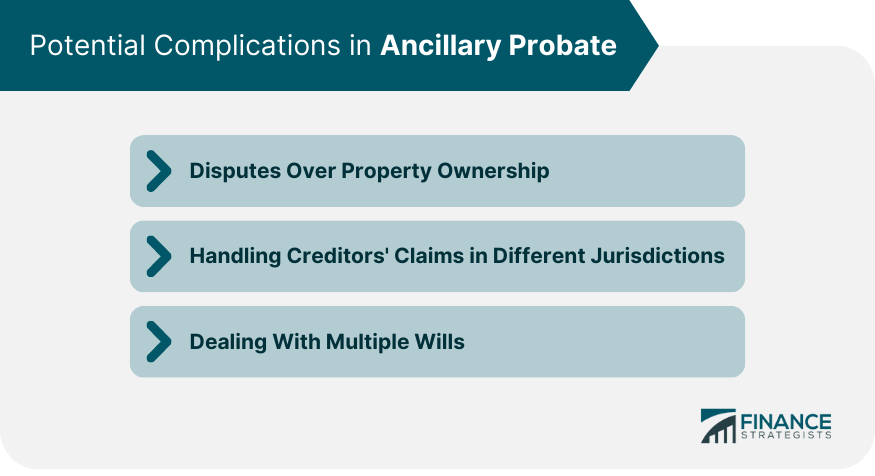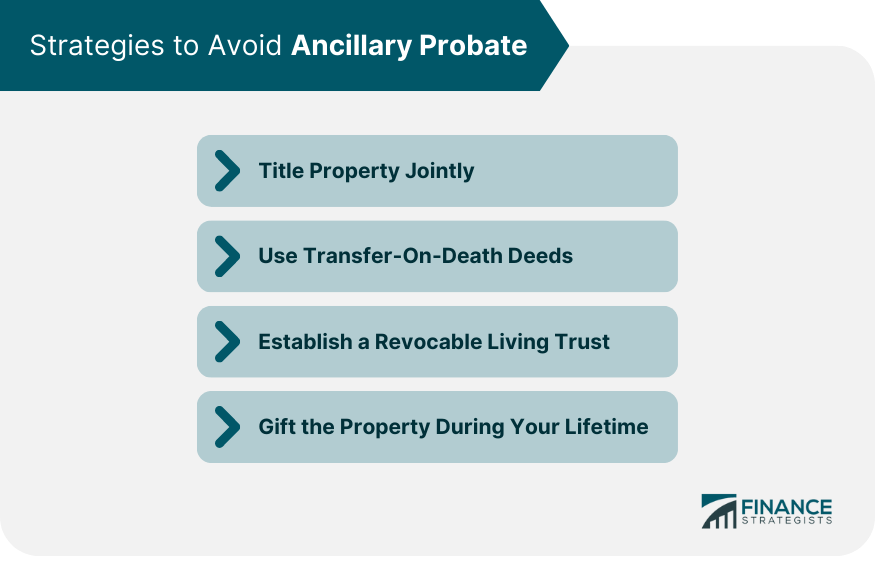Probate is a legal process overseen by a court to distribute a decedent's assets after their death. The procedure ensures that debts are paid, and any remaining assets are distributed to the rightful heirs or beneficiaries. Ancillary probate refers to a specialized probate procedure initiated in a different state or jurisdiction from where the deceased primarily resided. This process becomes necessary when the deceased owned real estate or other titled assets in a state outside of their domicile or permanent residence. For instance, if an individual, domiciled in California, owns a vacation home in Florida, ancillary probate will be required in Florida to transfer that property according to the terms of the decedent's will or the laws of intestate succession, if no will exists. The first step in ancillary probate is typically to initiate the primary probate proceeding in the decedent's domicile state. Once the home state probate is underway, an ancillary probate proceeding can be started in any other state where the decedent owned property. Assets subject to ancillary probate usually include real estate and other titled assets located in a state other than the decedent's domicile. Personal property, such as vehicles, boats, or airplanes registered in another state, may also necessitate ancillary probate. An executor or personal representative must be appointed to administer the ancillary probate. Some states require the appointment of a local resident as the ancillary representative, while others may allow the executor from the primary probate to serve in this role. If the decedent had numerous properties in different jurisdictions, owned a business, or had complicated investments, the process will take longer. It may also cost more owing to the additional management and legal work such may entail. Each state sets its own laws and fee schedules for probate proceedings. These costs can include filing fees, publication costs, bond premiums, and other administrative expenses. Some states also base their probate fees on the value of the estate's assets. Other states have mandatory waiting periods or notification periods that must be adhered to, affecting the ancillary probate completion time. If there are disputes about the will or property ownership, or if creditors make claims against the property, the cost and duration of ancillary probate will rise. Legal fees and time spent can mount quickly if disputes need to be resolved in court. This usually occurs when multiple parties stake a claim over the same property, triggering a legal battle that can drag the probate process for an extended period. For instance, suppose the decedent’s will is vague or ambiguous about who inherits a particular asset. Other times, the will might clearly stipulate the intended beneficiary, but another individual contests the will, alleging undue influence, fraud, or the testator's lack of capacity when the will was created. Another common dispute arises when the decedent was divorced and remarried, and the ex-spouse and current spouse both claim rights to the property. Similarly, disputes can occur between children from different marriages, or between named beneficiaries and those who believe they were unjustly omitted from the will. Creditors may include credit card companies, mortgage lenders, hospitals, or any other entity to which the decedent owed money at the time of their death. Each state has its own laws about the length of time a creditor has to file a claim against the estate, how the personal representative should notify potential creditors of the decedent's death, and the order in which debts should be paid. This can be particularly challenging in an ancillary probate where the personal representative has to juggle the different rules in multiple states. For instance, some states may require creditors to submit their claims within a shorter period compared to others. Some states may require personal representatives to actively search for and notify potential creditors, while others require only a published notice. Missteps in handling creditors' claims can expose the personal representative to personal liability, further complicating the process. It's not uncommon for an individual, especially one with property in different states or countries, to have more than one will. Each of these wills may contain different instructions regarding the distribution of assets, leading to confusion and potential disputes among beneficiaries. Additionally, the laws regarding the validity and interpretation of wills may vary from one jurisdiction to another. In such cases, the court may need to reconcile these differences, a process that can be time-consuming and costly. In some instances, the decedent might have made a separate will for their out-of-state property without considering the contents of their original will. This could inadvertently lead to conflicting instructions. For example, the decedent might have left their entire estate to their children in their original will, only to later make a separate will leaving their out-of-state property to a charity. Such conflicts can take considerable time to resolve and might necessitate court intervention. One simple strategy to avoid ancillary probate is to title the property jointly with rights of survivorship. When one owner dies, the property automatically passes to the surviving owner, bypassing the probate process. This strategy works well for married couples or close family members who trust each other implicitly. However, joint ownership can sometimes lead to complications, such as when the surviving owner has creditors who might attach the property to satisfy their claims. Also, it could lead to potential estate tax issues if the property's value exceeds the federal estate tax exemption. Some states allow transfer-on-death (TOD) deeds for real estate. This strategy allows a property owner to execute a deed that names a beneficiary who will inherit the property directly upon the owner's death, without the need for probate. The benefit of a TOD deed is that the owner maintains control of the property during their lifetime and can change the beneficiary or sell the property without the beneficiary's consent. However, it's essential to know that not all states recognize TOD deeds, so local law must be consulted. A revocable living trust is a legal entity created to hold ownership of an individual's assets. The individual can control the trust during their lifetime and then the trust assets are distributed to the beneficiaries by a trustee upon the individual's death, bypassing the probate process. One of the main advantages of a revocable living trust is that it avoids the probate process not just in the decedent's home state, but in any other state where they owned property. Also, trusts offer great flexibility in determining when and how the beneficiaries receive their inheritance. However, establishing a trust involves some upfront costs and administrative tasks, such as retitling assets in the name of the trust. This effectively removes the property from your estate, ensuring it's not subject to any probate process. However, this strategy must be carefully considered. Gifting a property means you lose control over it, and the gift cannot be taken back. Also, gifting property can have significant tax implications for both the giver and receiver, especially for high-value properties. Therefore, professional advice should be sought before employing this strategy. Ancillary probate is a specialized legal process required when a deceased individual owns property or titled assets in a state other than their domicile. This additional probate proceeding can add complexity, cost, and time to the overall probate process. Disputes over property ownership, dealing with creditors' claims in different jurisdictions, and the presence of multiple wills can further complicate the process. To avoid the complications of ancillary probate, individuals can title property jointly with rights of survivorship, use transfer-on-death deeds, establish a revocable living trust, or gift property during their lifetime. Each strategy has its advantages and considerations, such as control over the property, tax implications, and the need for professional advice. By understanding these options and factors that affect ancillary probate, individuals can navigate the process more efficiently and potentially minimize complications.What Is Ancillary Probate?
How Ancillary Probate Works
Factors Affecting the Costs and Duration of Ancillary Probate
Complexity of the Estate
The State's Specific Probate Laws
Disputes or Claims Against the Property

Potential Complications in Ancillary Probate
Disputes Over Property Ownership
Handling Creditors' Claims in Different Jurisdictions
Dealing With Multiple Wills

Strategies to Avoid Ancillary Probate
Title Property Jointly
Use Transfer-On-Death Deeds
Establish a Revocable Living Trust
Gift the Property During Your Lifetime

Final Thoughts
What Is Ancillary Probate? FAQs
Ancillary probate is a legal process for distributing assets owned in a different state or jurisdiction from where the deceased primarily resided.
Ancillary probate is necessary when a deceased individual owns property, such as a vacation home or titled assets, in a state other than their primary residence. It ensures that the property or assets are transferred according to the terms of the decedent's will or the laws of intestate succession if no will exists.
The first step in ancillary probate is typically initiating the primary probate proceeding in the decedent's domicile state. Once the primary probate is underway, an ancillary probate proceeding can be started in any other state where the decedent owned property. The assets subject to ancillary probate include real estate and titled assets located in a state other than the decedent's domicile.
Factors such as the estate's complexity, specific state probate laws, and disputes or claims against the property can impact the cost and duration of ancillary probate.
Yes, strategies to avoid ancillary probate include titling property jointly, using transfer-on-death deeds, establishing a revocable living trust, or gifting property during one's lifetime. Professional advice is recommended to choose the most suitable strategy.
True Tamplin is a published author, public speaker, CEO of UpDigital, and founder of Finance Strategists.
True is a Certified Educator in Personal Finance (CEPF®), author of The Handy Financial Ratios Guide, a member of the Society for Advancing Business Editing and Writing, contributes to his financial education site, Finance Strategists, and has spoken to various financial communities such as the CFA Institute, as well as university students like his Alma mater, Biola University, where he received a bachelor of science in business and data analytics.
To learn more about True, visit his personal website or view his author profiles on Amazon, Nasdaq and Forbes.











